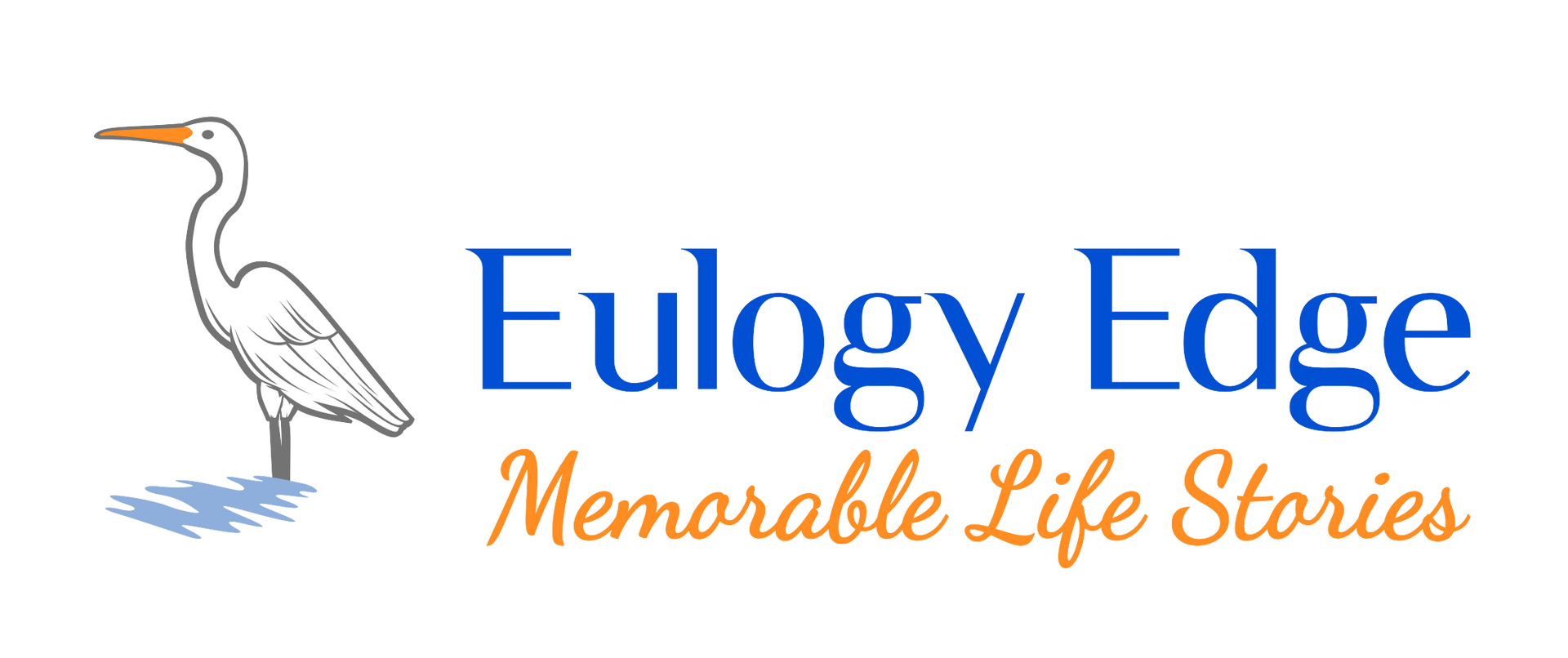Frequently Asked Questions
Eulogies, Life Stories and Dealing with Loss
-
How long should a eulogy be?
The best length for a eulogy is around five minutes, and up to 7 minutes if needed.
This timeframe keeps listeners interested and focussed.
To work out the most important things to say, stay within the timeframe, and keep people interested all the way through, click here for more tips and information.
-
What information is included in a eulogy?
A eulogy includes information about the person's life, in a combination of stories and facts.
The main things to include are:
- Important events in their life, such as their family make-up, when and where they were born, and their main careers or jobs.
- Major turning points in their life - getting married, having children, moving to a new country, and serious illnesses or other mishaps.
- Stories that demonstrate their personality traits in an entertaining and informative way.
- How they lived their life in terms of achieving their own goals or meeting their own needs.
- The impact they had on others - what they did for friends, family and the community, and how others felt about them.
Read more here.
-
Who should give a eulogy?
These days, eulogies are often given by more than one person, and they can be family members, friends, work colleagues and so on.
This is a more personal approach than in the past where a eulogy would often be given by a religious practitioner, funeral celebrant, or sometimes the eldest male or person in the family.
Most places, including religious places, allow friends and family to give a eulogy.
Personal eulogies given by people who knew the person who has died are more relatable, authentic, and captivating. It is great to gather information from various parts of the person's life, to give a more complete picture of their life, as everyone shows different sides of themselves in different situations - speak to all the generations of their family, clubs they belonged to, places they hung out, their friends,hobby, sport and religious groups, their neighbours, and so on.
Read more here.
-
How do you write the best eulogy?
The best eulogy is a balance of information/facts and stories that create a picture of what the person was like in various aspects of their life. It needs to be fairly honest, as a eulogy that portrays someone as a saint can seem inauthentic. Humans are complex and that's what makes us individuals. People want to hear about different stages of life, character traits, funny and strange things that happened, and how they related to the world and lived their life.
The best eulogy is captivating and memorable, and leaves the listeners with a new image of the person who has died. You can guide people towards that new and everlasting image with a great eulogy.
More tips and information here.
-
I need a kit or guide to help me write a eulogy
There's usually not much time to prepare a eulogy when someone dies, and grief and stress have an impact too. Whether you're good at writing or not, a guide will be really helpful at this time.
If you want or need to give a eulogy and you're hesitating, our guidebook, "7 Steps to a Memorable Eulogy" will guide you step-by-step. It's not often that you have to write a eulogy, and it's not something you'll want to regret for years to come.
Find out all the details here.
-
Is it too hard to write my own life story?
Yes, it's quite easy to learn and practise the skills needed to write your own life story. And with the technology and devices that everyone now has access to, you can get help with grammar, spelling, and even the typing!
You are the best person to write your life story, as you know it best, and you will naturally create it with your own natural style.
Find more information here.
-
How can I move on from the loss I've experienced?
Everyone takes a different amount of time and has their own hurdles to jump over when they have lost someone close to them. No matter what your relationship was like, when you've been around someone or have had some sort of connection with them, you can feel lost and unsure how you fit into your life now that they're gone.
There are techniques you can use to slowly take some steps towards reclaiming your life and finding out who you are and who you want to be now.
If you've experienced loss, here are some techniques you may like to try.

Great Things People Say About Us

“It showed me everything I needed for a proper eulogy – what to put in and leave out. The planning at the start helped me come up with ideas and lined everything up ...”
Jett W - age 20
"Very comprehensive and clear and flows well, covering everything you could think of!"
Angela R - age 62
“I'm so glad I took the leap to do this and my eulogy was so good! People were amazed ...”
Olivia S - age 36

